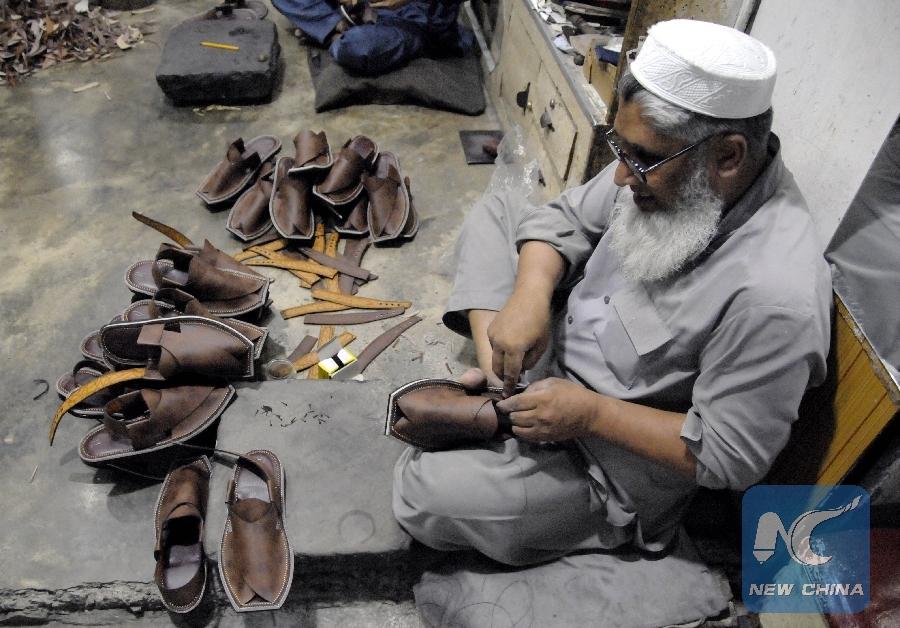
A worker makes traditional shoes locally called "chapli" for the upcoming Eid al-Fitr festival in Peshawar, northwest Pakistan, May 29, 2019. (Xinhua/Saeed Ahmad)
ISLAMABAD, June 2 (Xinhua) -- As the traditional festival Eid al-Fitr is just around the corner in Pakistan, the demand of the country's traditional leather sandals locally known as "Peshawari Chappal" has soared with local artisans getting orders from Pakistan and beyond.
Peshawari Chappal, which is also known as "Keri" in a local Pashtu language, took its name from the northwest city of Peshawar where it originated from. It is distinguished by two overlapping leather strips that cover the foot and a back-side strip with a buckle to tie according to the foot size and level of comfort.
The sandals used to be worn by ethnic Pashtun people in the northwest Khyber Pakhtunkhwa region in the past, but with the advent of social media, its popularity in other parts of the country and internationally has increased many folds.
Nowadays, markets are flooded with Eid shoppers taking keen interest in different designs and varieties of the traditional footwear, said Ihsan Khan, a local artisan in Peshawar, adding that although the sale remained good throughout the year, but during Eid season it was touching new heights.
"I have received many orders from across the country over the past several days due to Eid festival, while I have also hired additional skilled workers to meet the deadline of the booked orders," Khan told Xinhua.
He said that the traditional footwear is being ordered from countries in Europe, Afghanistan, and Gulf countries as it is no longer confined to any specific culture or age group and is being loved by all social classes ranging from politicians to laborers.
The shoes gained much popularity at a national level when Pakistani Prime Minister Imran Khan was noticed by his followers wearing the same traditional shoes during his public appearances, giving boom to the sale of the traditional footwear.
Peshawari Chappals are usually worn with Shalwar Kameez, a type of suit with loose trousers and a long shirt since Shalwar Kameez is the most common dress during festivities and important events in Pakistan. Apart from that, urban youth also like to wear it with Jeans and T-shirt.
"It's durability, comfortability, as well as adaptability with different attires, made Peshawari Chappals my favorite choice," said Haider Ali, a resident of eastern Lahore city, told Xinhua, adding that he has ordered some 10 pairs for himself and family friends on the festive occasion of Eid.
"Besides as Peshawari Chappals are handmade, they are well stitched and can be ordered in customized sizes as well as colors and designs," Ali said.
Walladin Shinwari, a local manufacturer who has been associated with the business for more than 25 years, told Xinhua that although his business is doing great currently, but recently several famous Pakistani brands too initiated the sale of Peshawari Chappals, a trend being seen as a threat to business of local manufacturers as they can't afford to hire a large number of workforce and machines as compared to wealthy franchises.
"Local manufacturers are looking for government's assistance for the introduction of new techniques and machinery so they could compete with famous brands domestically and internationally," he said.

